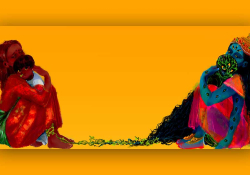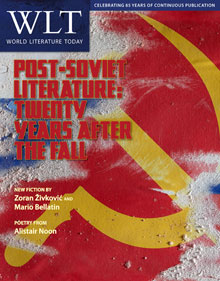"The Demon of Hunger"
Ukrainian writer Tanya Malyarchuk’s work fuses Chekhov-like psychological portraits of characters with magical realism. Many of her most fascinating narratives focus on her life growing up amid the mysterious Carpathian Mountains.

My throat hurts. I can’t speak much. And to be honest, I don’t have anything to say. I think a lot, but for some reason I don’t have my own opinion. I don’t know how to gauge what is happening with me and with people I know. I just know one thing—I’m very sentimental. Don’t be offended that I cry so much. That’s normal. I can cry even more. It’s just when I hear a sad story, tears gush out on their own from my eyes. I can cry all day and another night—I’ve confirmed that. When I cry I feel happy. Cleansed.
I love to hear love stories the most. Sentimental ones. When two people love each other, and something external prevents them from being together. I love it when the two lovers live their entire lives separately, and die separately, but always remember each other. They have different husbands and wives, but they never forget that strongest love of their lives. And when, for example, a man dies in the arms of a different woman (who, perhaps, also happens to love him), the other woman stands at the window, then at the cemetery, but not with everyone else, but off to the side, just to see him for the last time. Oh, you see, I’m already crying, but it’s normal. Don’t stop me.
Other people’s love stories affect me more than my own because I’ve never loved anyone deeply. Perhaps I still might. I don’t know. But my own stories aren’t particularly striking. I don’t know why. It certainly depends on the way they’re told, because you can tell them in one way that makes everyone begin to cry, and in another way that makes everyone laugh. The very same story.
My grandmother always told me stories in a way that made me cry. She cried, too. Both of us cried. That’s when I understood for the first time how nice it is to cry from hearing stories.
My grandmother had a real talent for storytelling. She certainly must have suffered something so awful in her own skin that later she had something to tell. She remembered details very well. In fact, I would cry from the details. Grandmother once asked me:
“Do you know what birch kasha is?”
“No, I don’t. What is it?”
“It’s when you’re beaten with thin birch switches. They whipped me one time, but I remembered the taste of birch kasha my entire life.”
“And what does it taste like?”
“Salty. And slightly bitter. Because the birch itself has a bitter taste when you lick it.”
Grandmother had to take care of her stepmother’s small child, and that child fell from the shelf atop the stove to the floor. Grandmother ran away into the woods because she feared that her stepmother would beat her. Her stepmother would always give an extremely painful whipping. Grandmother left the child lying on the floor and ran away. She thought it had died from the fall. But no. Nothing actually happened to the child. It’s very difficult to take a child, like drunks, to the point of death. They have an extraordinary tenacity for life. Just like cats. Grandmother sat till evening in the forest not far from her father’s house. She watched what was happening in the house from behind the bushes. But her stepmother knew where grandmother was hiding. When it began to get dark, her stepmother walked out into the yard and shouted:
“Come home! I’m not going to beat you! Come home! It’s late already. You haven’t eaten anything all day! Come home, child, I’ll give you some really tasty birch kasha to eat! Come home, don’t be afraid!”
Grandmother believed her. She came out from behind the bushes to her stepmother because she was really hungry. Grandmother always used to be hungry as a child, and later, even in her old age, was always hungry. She stepped out to her stepmother and said:
“Where is the kasha?”
“Go inside. It’s in the house.”
Grandmother went inside, but her stepmother had already prepared the birch switches. She grabbed grandmother by the arms and began to whip her on her legs, her back, her behind. Her face. She screamed out:
“You little bitch! You wanted to kill my child, did you? You shoved her off the shelf on purpose!”
She beat her until grandmother’s father came home from work. He dragged her away from her stepmother, but my grandmother already couldn’t move or speak. She was covered in blood. Then her father started to beat the stepmother—not with the birch switches, but with his fist instead.
The stepmother hated my grandmother. She used to feed her borscht with soap, and one time even with rat poison. This is all true. I’m not lying. It’s the pure truth. Though you might not believe something like this could actually happen.
At six years of age, grandmother ran away from home and ended up in a boarding school.
At seven, she escaped from the boarding school because she was afraid of starving to death. In the boarding school, grandmother learned a new recipe for soup: water with two string beans.
At eight, grandmother lived at the Novohrad-Volynsk market and used to eat plum pits.
Then she herded cattle at the collective farm. Next she tended the farm of a man who promised her warm clothing for the winter for a year of work. Then after two years of additional service to him, grandmother earned a young calf. She took the calf by a tether, said farewell to the owners, and went to the city of Zhytomyr. The calf died in a week. Grandmother had to butcher it. She traded the calf meat for two tarpaulin cloth boots—both of them left-footed.
I’m telling you all this in brief, but it took grandmother ten years to tell it all to me. For ten years she told me the stories, down to the smallest details and particulars. I know her life by heart. Perhaps that’s why I don’t pay attention to my own. At times it seems I’m not living for myself, but just for my grandmother—so she’ll have someone to tell everything to, and so that person will tell those stories to other people. Grandmother is quite at fault in my eyes. She deprived me of any desire to live my own stories. She didn’t give me the opportunity to become anybody, not even an independent individual.
And the worst of it was that grandmother never loved anyone. Perhaps because she was hungry her entire life. But she loved no one at all. Not men, not her own children, not even me, though I always listened to her politely. No one. Not even herself. Now, in retrospect, I think that during her childhood days the demon of hunger settled in her. I don’t know if such things exist at all, but that’s what I think.
When suddenly there wasn’t anything at home to eat, grandmother would become enraged. She might even hit me. Her eyes became enraged—cruel and estranged. She could chew through someone’s neck for a piece of bread. She fastidiously brushed up the crumbs from the table and then forced me to eat them. She always cooked a great amount and with a lot of fat. The fat would float in the pot in a thick ball, so I couldn’t even look at the soup. Lard was her favorite food. She kept the lard in a cupboard in half-liter jars. There seemed to be an endless number of those jars in the cupboard. And there seemed to be an endless number of jars of string beans. In the attic eaves. At various stages of shelf life. Some of them were older than me.
The fear of starvation controlled grandmother’s life. When the summer rain would suddenly fall for a long time, grandmother would sit in the garden and announce what now would happen to the potatoes, the string beans, the beets, and the corn. “Oh Lord, what will happen now? We’ll all die of starvation!”
One time, I remember it quite well, grandmother’s demon of hunger settled in me.
I have never been particularly enthusiastic about food. I always just ate what was there, sometimes a little, sometimes a lot, but without any zeal. But then something happened. One day I had been asleep for a really long time, till noon. I had frightening, disturbing dreams, from which it was really difficult to awake. And when I awoke, I wasn’t able to get up from bed and go over to the summer kitchen where grandmother was making borscht. It was a really tasty borscht. Even right this moment I can smell the aroma of the hot borscht. But I couldn’t move. I was so incredibly hungry that I couldn’t move. An immense painful hole in my stomach opened up, a precipice, into which I was falling. My stomach became me, that is, I became my stomach. I was so hungry that I would have been able to eat the tablecloth on the table next to the bed or my shoelaces. Never before and never after has anything similar ever happened to me. I made my way to the summer kitchen like a zombie, holding on to the handrails of the pens. I didn’t say “hello” to my grandmother. I simply sat down at the table—and she figured out everything. She gave me a bowl of borscht right away and watched me gobble it down. Because I really was gobbling, and not just eating it. Grandmother looked at me and was overjoyed. It was as if I had become just like her—her rightful successor. Her shared child with the demon of hunger. That’s why I’m so sentimental. For us both.
When my grandfather died, grandmother made me sleep on his bed. When I would be staying over at her place after that, I would always have to sleep on his bed. On the bed where my grandfather died. But grandmother didn’t worry herself over this. At times I would say to her that it was difficult for me to sleep on that bed, that I have nightmares, that I’m afraid, but my words just got on my grandmother’s nerves. She didn’t understand me. And I dutifully continued to dream those nightmares.
Only at the age of twelve did I come to realize that I needed to run away from my grandmother as far away and as quickly as possible.
We were picking the string beans in the garden together. It was a warm August day. Grandmother was telling me her next story while I was tearing out the bean pods, placing them in big piles for her, and carrying them to her yard in burlap. I don’t know how it reached this point, but grandmother confessed. I don’t remember. Perhaps I said something about life on the other side, about paradise and hell, about the soul, but back then I used to love talking about such things.
And grandmother suddenly said:
“I don’t believe in the soul! I don’t believe in anything. A person dies and their bones decay and that’s it. Period. The end. There’s nothing more.”
“Grandma,” I said to her, “it’s really terrifying to think that way. Aren’t you terrified you’ll die, and your bones will decay, and that’s it?”
“What’s there to be afraid of? That’s the way it should be.”
“Then why live at all then, if afterward there’s nothing?”
“How is that nothing? Look, you are! You’ll remember my life, I’ve told you everything. That’s immortality.”
I came to realize then that I needed to run away. I stopped tearing off the bean pods and ran away. I ran away from my grandmother and from her life to mine. Because I don’t want to be her immortality! I want to have my own! It’s not fair like that! I also have a right to my own life and to my own immortality! I don’t want to be a victim of her lack of faith! That’s what I thought when I ran away.
I’m thirty years old now. My grandmother died a long time ago. I didn’t even go to her funeral. But I wasn’t able to save myself anyway. For sure, I escaped too late. I don’t have my own stories—just hers. And I tell other people her stories. Against my will. Unintentionally. Something sits inside me that constantly spurs me on to continue telling the stories. And when I tell them, I feel really happy, and I cry, and I’m happy. That’s why I’m asking you to listen a bit more to me! Just a bit more! Don’t go away! Listen just for a minute! During the war grandmother was working in a military hospital mess hall and somehow fell asleep in a great big vat while she was washing it . . .
Translation from the Ukrainian
By Michael M. Naydan
Editorial note: “Bis holodu,” from Hovoryty (2007; To speak), copyright © 2007 by the author. English translation copyright © 2011 by Michael M. Naydan. For more by Malyarchuk, read her story “Canis Lupus Familiaris” online at Belletrista.











